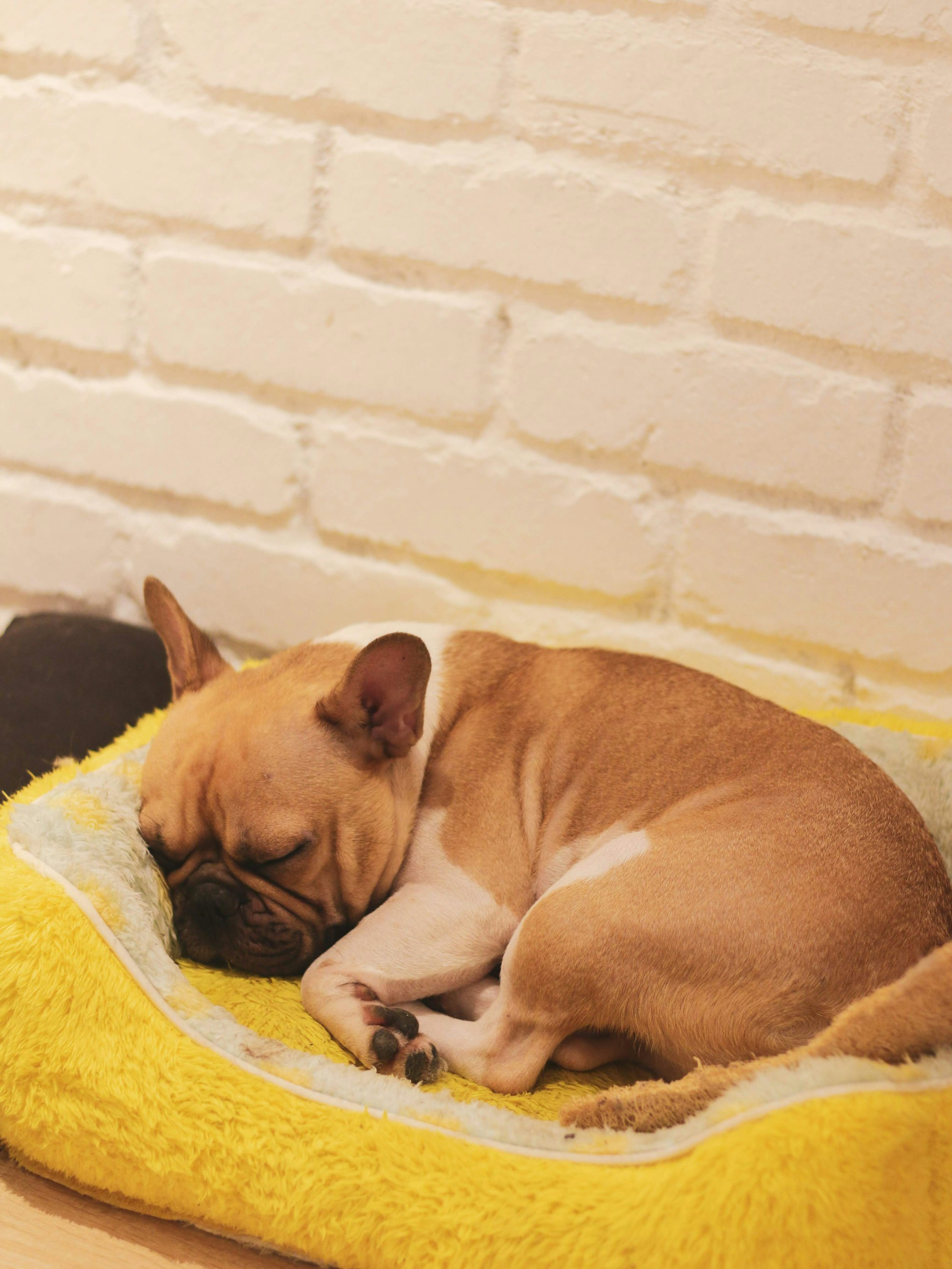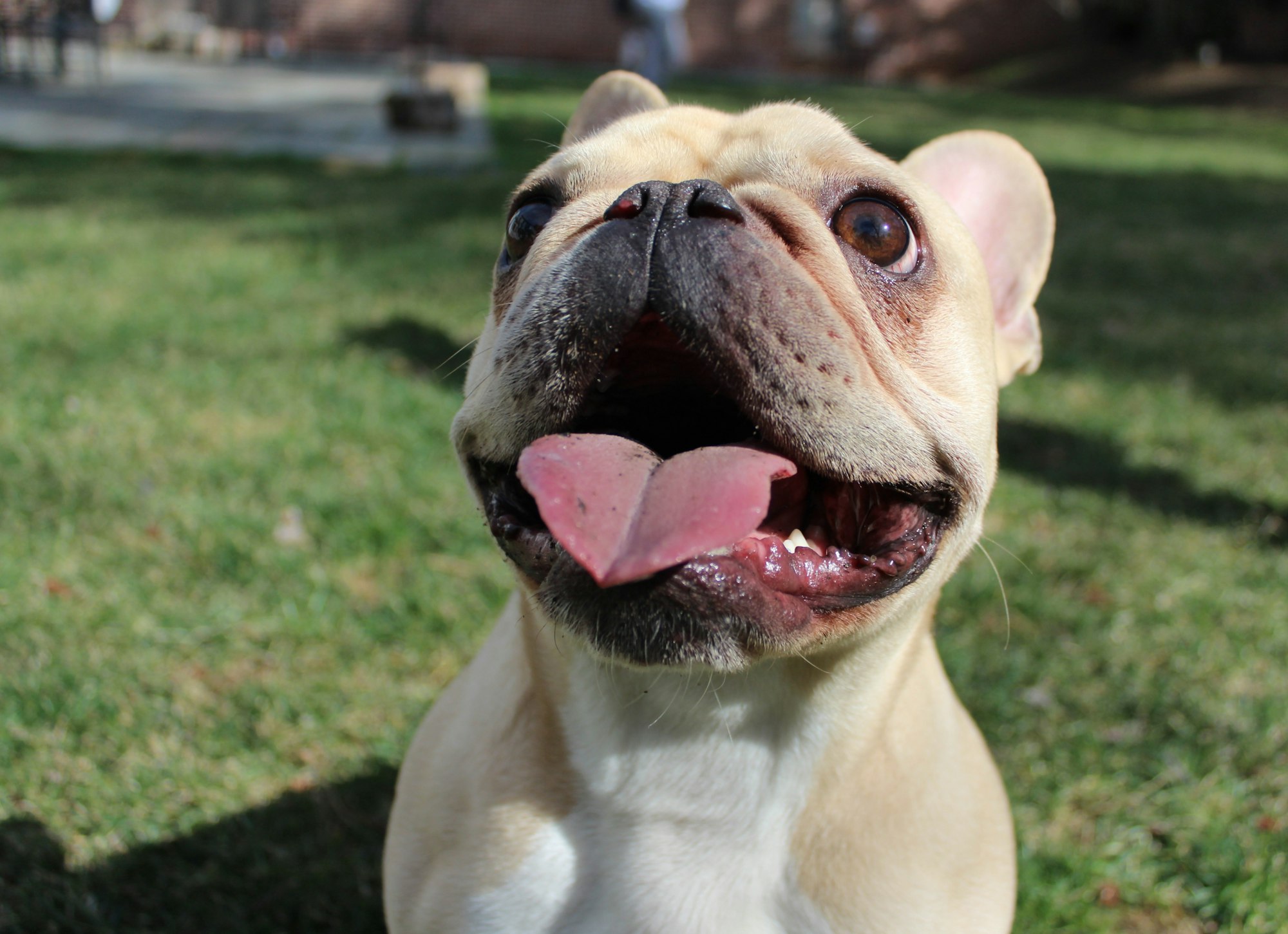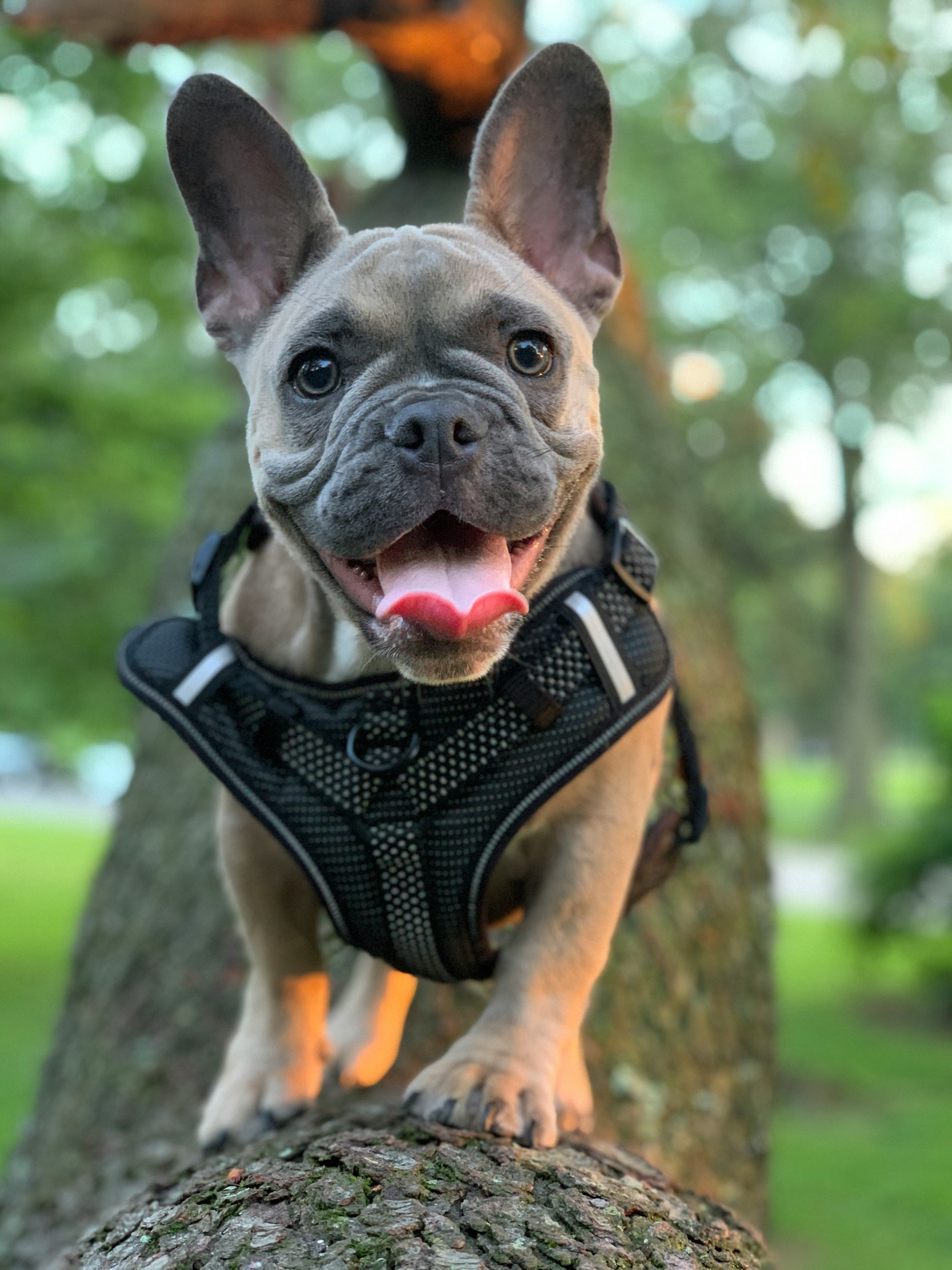New pet owners want to know everything there is to know about their favorite breeds. If you have recently fallen in love with a French Bulldog, one of your first questions might be, “Do French Bulldogs shed?” The answer is that they do indeed shed.
Do French Bulldogs Shed?
French Bulldogs are small, short-haired dogs with smooth coats, so one would think that shedding would be minimal. They do tend to shed year-round, and more so during seasonal changes.
What is Shedding?
A dog's coat shields it from inclement weather and offers protection to its tender skin.
Hair has a lifespan with a cycle that includes growth and eventual death. Dogs—and most mammals—shed dead and damaged hair. They shed as the weather gets colder in preparation for growing a heavier winter coat. They shed when the temperature starts to rise to rid themselves of that winter coat. Indoor pets are not exposed to weather extremes and may shed all year.
It's a normal process. Some breeds shed a lot, and others not so much. The American Kennel Club puts Frenchies in the mid-range of normal shedding levels.

What is Excessive Shedding?
After you've had your French Bulldog for a while, you'll be familiar with its typical shedding pattern. A temporary increase at the start of spring and fall is no concern. However, if your Frenchie suddenly starts losing lots more hair or if the hair just doesn't look or feel right, it's time to check with your veterinarian.
What Are Signs of Excessive Shedding in French Bulldogs?
Here are some things to be concerned about when you think your dog is shedding more than normal. You will want to bring these issues to your veterinarian's attention:
- Poor coat condition
- Massive amounts of hair on the floor and furniture
- Clouds of hair in the air when you pet your dog
- Bald spots
- Red, itchy skin and rashes
- Sores or lumps
- The presence of fleas or mites

How Do I Stop my French Bulldog's Excessive Shedding?
The first thing is to understand why your dog is shedding excessively. If it's seasonal shedding, you'll just have to ride it out. You don't want to interfere with a normal process, and it won't last too long.
Think about any recent changes to your dog's environment. Have you moved to a new home or had a new baby? Change—even positive change—is stressful. It might take your dog a little time to adjust. Reassure your dog that it's still a valued member of the family, and give it a little time.
Are you using a different brand of dog food? Proper nutrition is an underrated aspect of keeping a dog's coat and skin healthy. Grain-free foods are popular now, but they are probably not what your pet needs for optimal health. Some low-quality brands do not contain the correct nutrients for keeping a dog's coat healthy and may even have ingredients that are known allergens!
Ask yourself if your dog might have a medical issue that needs to be addressed. Make that appointment with your vet. Some issues can be diagnosed with a physical exam. Others will require blood work or other tests.

Tips to Reduce Your Frenchie’s Shedding
- Feed high-quality dog food with the correct amounts of protein, vitamins and minerals, and essential fatty acids. Different breeds have different nutritional requirements. Your vet can suggest the right foods for your dog and might also prescribe supplements to correct deficiencies and improve your dog's coat. Don't forget that dogs need easy access to fresh water at all times.
- Keep your dog and home parasite free. Use only vet-approved products to control ticks, fleas, and mites. Get your dog on a schedule for worming and preventative medicines.
- Make sure your dog's environment is comfortable. Inside, dogs benefit from stable temperatures, just like people do. Temperatures that are too hot or too cold can make your Frenchie uncomfortable and cause excess shedding.
- Treat allergies promptly with the appropriate medications.
- Reduce the amount of stress your pet feels. Training family members to respect a dog's boundaries is important. A dog needs a place away from noisy daily activities to rest. Don't allow others to bother the dog when it's been overstimulated.
How Important is Grooming?
A well-groomed dog is less likely to shed excessively than a poorly-groomed one. Regular grooming sessions also allow you to catch skin problems early. It's a great bonding experience with your dog, too.
An untrained dog might be a terror at bath time, so start early to teach good habits. Unruly adults are no fun to groom, and you'll be tempted to let it go. Don't do it! Make bathing and grooming something that your dog will look forward to.
You'll want to bathe and groom your dog regularly—but not too often. Excessive bathing can remove the protective oils from your pet's hair and skin. Too much bathing can allow skin infections to blossom, defeating the purpose.
Most of us don't have a special dog-grooming area, but there are ways to make your bathroom or kitchen a safe place to pamper your Frenchie. Use bath mats in the tub or sink, so the dog feels secure. Hoses attached to the faucet or spout are a great invention for the dog groomer.
Your comfort and safety are important, too. Give yourself something soft to kneel on by the tub. And grooming a small dog is so much easier when you have a table to put them on.
What Are the Must-Have Grooming Supplies for a French Bulldog?
Every dog owner should have a grooming kit on hand. Some breeds require special grooming products and tools, but the Frenchie won't need much more than the standard supplies. Here are some things you will want to acquire:
- Dog brushes, a shedding tool, and optional grooming gloves
- Toenail clippers and styptic powder—just in case a nail bleeds
- A gentle dog shampoo and conditioner
- Bath towels
- Wipes for eyes and ears
- A box or bin to keep all your supplies together
How Do I Deshed a French Bulldog?
One of the easiest ways to deshed a Frenchie is with a deshedding tool. There are several designs available. These tools have a row of small, close tines that are designed to remove dead hair from your dog's coat. They can be especially effective during seasonal shedding.
To use a deshedding tool, place your dog on a table so that both of you are comfortable. Use a non-slip mat, so your dog feels safe. You will use the tool like a brush, making long, gentle strokes down the dog's back. Be careful of tender areas like bony prominences and soft bellies. Work slowly, and stop if your dog becomes anxious.
You will be able to remove lots of loose hair with a deshedding tool, which will decrease the amount you find on your clothing and furniture.
There are also deshedding shampoos that loosen dead hair and also condition the skin so hair is healthier.

What Causes French Bulldogs to Shed Excessively?
Aside from the issues already noted, some medical conditions might cause your dog to shed excessively. Here are a few:
- Parasitic conditions like flea bites and allergies and manage
- Fungal infections like ringworm
- Allergies to foods, chemicals, or even seasonal allergies
- Hormonal issues like hyperthyroidism or Cushing's disease—or even a normal heat cycle and pregnancy in female dogs
- Here are closer looks at the three top reasons Frenchies shed excessively.
1. Stress
As discussed before, our pets are prone to experiencing stress from some common life events. New routines, new pets or people in the home, changes in diet and exercise, neighborhood construction noise, stormy weather—there are many reasons our pets might feel stressed.
While it's not always possible to return to former conditions, most pets will adapt with love and a little time. Training can help manage some stressful situations.
However, it is sometimes necessary to seek veterinary care for a distressed pet. Dogs with severe separation anxiety can certainly benefit from professional advice. Careful use of medications can help your pet cope with stress and begin to relax.
2. Poor Nutrition
Dogs have particular nutritional needs that are almost always met by feeding high-quality commercial dog food. Your vet is the best source of information and can suggest special diets if your dog has unusual dietary needs.
Puppies and older dogs have different needs, as do canine athletes. There are even breed-specific forms that may prove best for your pet.
It's best to avoid gimmicks like grain-free foods or those advertised by celebrities. Just like with human diets, fads come and go. Sticking to the tried and true brands and formulas is generally the best idea.
Supplemental vitamins and essential fatty acids can be a huge help if your Frenchie suffers from poor skin conditions. A veterinarian can tell you which ones are going to be helpful.
3. Medical Problems
Having a medical diagnosis can be scary, but it gives you the opportunity to bring your dog back to optimal health. Many skin conditions that cause excessive shedding can be treated easily.
Problems caused by parasites go away when the parasites are treated. Fungal infections can be stubborn but are treatable.
Allergies of all kinds are treatable. Some go away forever. Some return from time to time, as with seasonal allergies. Others require constant care to control the symptoms. Your dog can certainly be made more comfortable with allergy treatments.
Hormonal issues can mean lifelong medications. It's a small price to pay to keep your dog healthy.
And the hair loss that sometimes comes with female heat cycles and pregnancy is self-limiting. Your vet may discuss spaying a dog that suffers greatly from this hair loss, but it's probably not going to be a serious issue.

Are French Bulldogs Hypoallergenic?
No, they are not hypoallergenic. No dog truly is. And many people are allergic to the dog's dander and saliva rather than the hair anyway.
Do French Bulldogs Shed All Year Round?
Yes, they do! Most indoor dogs are year-round shedders. You can expect spring and fall to bring extra seasonal shedding, too.
But Frenchies are so darn cute that most people think they are worth the trouble to keep the hair in check.
Do Exotic Color French Bulldogs Shed More?
It depends. Some people think that darker-colored Frenchies shed less than those with lighter-colored coats like the lilac French Bulldog. The blue Merle French Bulldog is one of the rarest colors, and includes platinum, chocolate, and black.
Unless you plan to show your Frenchie, coat color is a matter of preference. But you should be aware that exotic-colored dogs are not approved for the show ring.
Another genetic anomaly that occurs is that the breed produces pups that have long hair, which is considered a fault for a show dog. They are called Fluffy French Bulldogs, and here's the lowdown on them.
Do Fluffy French Bulldogs Shed More?
Fluffy French Bulldogs, which have a longer and thicker coat due to a recessive gene, may require more frequent grooming to prevent matting and tangling, but they are not necessarily higher shedding than regular French Bulldogs. It's always a good idea to consult with a veterinarian or professional groomer for advice on the specific grooming needs of your individual French Bulldog, regardless of its coat type.

What is Your Recommended Shedding Brush and Tool?
Many owners of French Bulldogs love the FURminator. You can find it on Amazon and at pet supply companies.
Another one is the pet grooming brush from DakPets, also available online and in stores.
Conclusion
For a small dog, it might seem like the French Bulldog takes a lot of grooming to control shedding. But it's really not so much when you consider how much love you get in return.
All dogs shed. Some just shed more than others. Knowing what you are getting into before you fall in love with that sweet face and funny ears lets you prepare for your long-term companion. Having the proper supplies and tools on hand will make life with a Frenchie so much easier for both of you.
From the start, committing to taking proper care of your pets from the start ensures a long and happy partnership. The thought of a little hair on your black dress pants and favorite chair shouldn't come between you and one of the best dogs a person can have. So, go ahead and fall in love with a French Bulldog.
It's worth the extra grooming and a little more sweeping and vacuuming to have one of these happy little dogs in your life.
For more helpful articles about pet-parenting tips, check out the Off Leash blog at TryFi.com.
Want to know more about TryFi.com? The Fi Dog Collar is a GPS tracking collar that not only keeps track of your dog’s location, activity levels, and sleep patterns, but it also alerts you if your dog escapes your backyard. This is the fastest way to find your dog after an escape. Try the Fi Dog Collar today!

